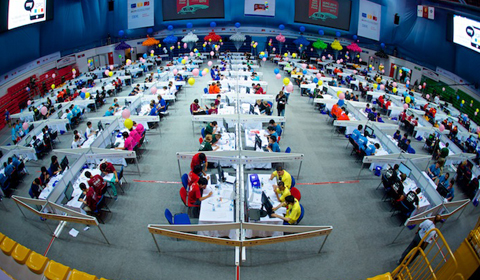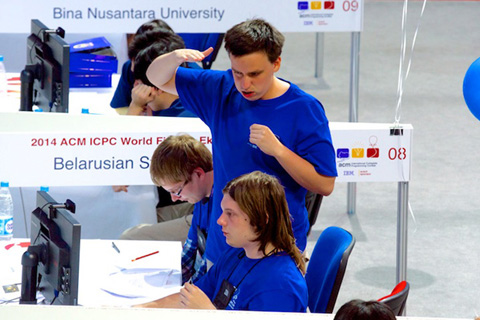Belarus Hi Tech Park
BSU Students Successfully Participated in Global Programming Championship
26 June 2014
During June 22-25, 2014 the World Finals of the ACM International Collegiate Programming Contest (ACM ICPC) took place in Ekaterinburg, Russia.
Held annually under the auspices of ACM (Association for Computing Machinery), it is the most important programming competition among student teams. 33 430 students from 2385 universities and 89 countries competed in regional contests for the right to take part in the World Finals. 122 best teams came to Russia to fight for the medals and the title of ACM ICPC 2014 Champion, 33 teams from Europe, 21 – from North America, 17 – from Latin America, 7 – from Africa and the Middle East, 42 – from Asia and 2 – from Oceania. Teams from Belarusian universities have participated in regional contests since 1996. Teams of the Belarusian State University (BSU) regularly advance to the World Finals and successfully solve problems there. BSU students won gold medals in 2004 and bronze medals in 2008. In 2012 Belarusian students from BSU and BSUIR won silver and bronze medals correspondingly. Last year, a BSU team won silver medals.This year, a BSU team represented by the 3rd-year students of the Faculty of Applied Mathematics and Computer Science Evgeny Gritskevich, Alexey Kolesov and Alexander Nekrashevich was the only one from Belarus to qualify for the World Finals. The students became 14th among 122 universities which is definitely a good result.
Teams from Belarusian universities have participated in regional contests since 1996. Teams of the Belarusian State University (BSU) regularly advance to the World Finals and successfully solve problems there. BSU students won gold medals in 2004 and bronze medals in 2008. In 2012 Belarusian students from BSU and BSUIR won silver and bronze medals correspondingly. Last year, a BSU team won silver medals.This year, a BSU team represented by the 3rd-year students of the Faculty of Applied Mathematics and Computer Science Evgeny Gritskevich, Alexey Kolesov and Alexander Nekrashevich was the only one from Belarus to qualify for the World Finals. The students became 14th among 122 universities which is definitely a good result.
 The team of Saint Petersburg State University solved seven tasks thus becoming the ACM ICPC 2014 champion. Teams of Moscow State University (7 tasks), Beijing University (6 tasks), the National University of Taiwan (6 tasks) have rated second, third and forth accordingly and got the gold medals.
The team of Saint Petersburg State University solved seven tasks thus becoming the ACM ICPC 2014 champion. Teams of Moscow State University (7 tasks), Beijing University (6 tasks), the National University of Taiwan (6 tasks) have rated second, third and forth accordingly and got the gold medals.
Teams of the University of Warsaw, Shanghai Jiao Tong University, the University of Tokyo and the University of Zagreb solved 5 problems each and got the silver medals.
Teams of Saint Petersburg National Research University of IT, Mechanics and Optics (5 tasks), National Research University Higher School of Economics, Russia (4 tasks), Tsinghua University, China (4 tasks) and Comenius University, Slovakia (4 tasks) received the bronze medals.
Teams of such internationally recognized schools of engineering as Massachusetts Institute of Technology and Stanford University, USA; the National University of Kyiv and the University of Kharkiv, Ukraine; Saratov State University, Novosibirsk State University, Ural Federal University and Moscow Institute of Physics and Technology, Russia and universities of China, Korea, Japan and India were left behind.
Final standings in the World Finals are available here.
For reference:
According to the World Finals Rules, each team of three people is provided with one computer and given 5 hours to solve 10 to 12 fairly difficult problems. To solve a problem means to write a program that will successfully pass all tests prepared by a jury. The team, which solves the biggest number of problems, wins. If there are several teams, which solve the same number of problems, the winner is determined by comparing time penalties. As a rule, 12 teams are recognized as winners – 4 gold, 4 silver and 4 bronze medal winners.